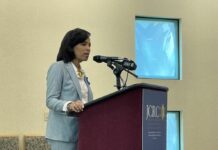
Photo courtesy of Bethesda Jewish Congregation
This is the second part of an interview with Rabbi Sunny Schnitzer, who is retiring as rabbi of Bethesda Jewish Congregation, a non-affiliated synagogue.
Read part 1 here.
How is the Jewish community changing?
The center of gravity for the Jewish experience has moved to Israel – a new nationalism, a homeland, a state. We’ve been at it for less than a century, which in Jewish time is a blink of an eye.
This Jewish culture of the last two centuries here in North America has been a time of gradual change. American Judaism forms still are rooted in Old World cultures that are fading into memory. Our success in America and our assimilation has stretched those bonds to breaking points. That stuff isn’t working for my children and probably won’t for my grandchildren.
There will always be a committed core of American Jews to the old ways. That number is going to continue to shrink radically. Some demographic projections say there will be half as many American Jews in another two generations as there are today. That is very sad for me, and I daresay it is very sad for all of us. … The attempt to live up to our highest prophetic ideals is really one of the reasons for the widening gulf between Jews in Israel and Jews in America.
How so?
We are living in societies that are becoming less and less alike. Primary for American Jews for over a century has been social justice for us and for others. We are a minority, so it’s in our self-interest. But Israel’s self-interest is in survival no matter the cost. And that creates a tension between the survival of the Jewish people and the rights of other people. That’s logical.
How is American Judaism changing and why?
I think we are in this time of paradigm shift.
We can’t rely only on our ancestors who sent their wisdom our way and their liturgy and traditions. We have to be the agents for change.
Synagogues and the places where Jews gather will have to change if we agree there is still value in coming together and connecting with each other.
[Our children] yearn for spirituality but not for dogma. They yearn for ways to express the longing of their hearts but the words have to be words that Americans can understand. They like ritual but the rituals have to matter to them. The yearning for community is so strong. So is the yearning for this deep connection to heritage, but these connective tissues have to be based on a new paradigm, one that might be less God-centered, and more centered on the essential oneness of all creation.





